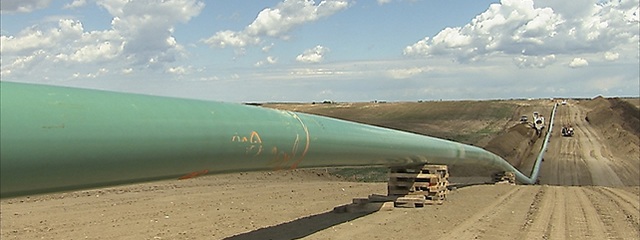Legislators hear from economic officials on Keystone XL pipeline cancellation
by January 28, 2021 3:46 pm 3,573 views

One of President Joe Biden’s first acts as president was to sign an executive order halting the construction of the controversial Keystone XL pipeline that would stretch from the middle of Alberta, Canada to oil refineries along the Gulf Coast. The project, first proposed in 2008, has been mired in legal and political controversies that have stretched through multiple presidencies.
Arkansas Secretary of Commerce Mike Preston told the State Senate Agriculture, Forestry and Economic Development committee on Thursday (Jan. 28) the pipeline was never slated to come through the Natural State, but stopping the project could have economic impacts on the state.
Welspun Pipes Inc., an India-based company that operates in the Little Rock Port Authority, had contracts to produce pipe for the project, Preston said. The company was slated to build 1 million feet of 36-inch pipe, and most of it has already been made, Preston said. About 600 people are employed at Welspun.
Preston said he thinks the project could be restarted through litigation or if the Biden administration has a change of heart. He noted that a second executive order, stopping the construction of a border wall along the U.S. border with Mexico could impact Atlas Tubing in Northeast Arkansas.
Welspun COO Rajesh Chokhani told committee members his company understands the importance of developing cleaner energy sources, but the world is predominantly run with oil and gas. He said the pipeline, which was slated to be finished by 2023, would significantly reduce the amount of oil that is moved on trains and by truck.
“We understand green and renewable energy is important,” Chokhani said. “The pipeline would reduce emissions.”
The Keystone XL project is a more than 1,200-mile pipeline expected to deliver 830,000 barrels of crude oil a day from Hardisty, Alberta, to Steele City, Neb., where it would connect with TC Energy’s existing facilities to reach U.S. Gulf Coast refiners. TC Energy announced in March it would continue work on the pipeline and invest about $8 billion in its completion.
Supporters of the pipeline project have touted that it will create 11,000 jobs and reduce emissions related to the transport of the tar sand oil that is harvested in that part of Canada. A report commissioned by the U.S. State Department in 2014 stated that about 3,900 full-time jobs would be created by the project, and those jobs would only be temporary while construction was ongoing. TC Energy has announced that about 1,000 workers in Canada have been laid-off as a result of the shutdown. If it were ever operational, it would create about 50 full-time jobs, and some of those would be in Canada, the report noted.
Opponents have railed against the project due to the poor quality of the oil extracted from the tar sand pits. The process to remove oil from tar sands is expensive and it can have a dramatic impact on the environment, they claim.
Tar sand oil is thicker, more acidic and more corrosive than lighter crude oil, according to the Natural Resources Defense Council. This makes any pipeline that is used to move this type of oil more prone to leaks, it says.
Glen Hooks, director of the Arkansas Sierra Club, said he was pleased with Biden’s decision to shut down the pipeline, and he reminded Arkansans of the Exxon disaster in Mayflower, Ark., seven years ago.
“As President Biden said yesterday, tackling the climate crisis and growing our economy go hand in hand. The 2013 oil spill in Mayflower demonstrated what happens when we don’t invest in our shared economic future towards a clean energy future. That’s why the climate actions Biden has taken so far are so critical for Arkansas, which is already home to thousands of good-paying clean energy jobs,” he said.
U.S. Rep. French Hill, R-Little Rock, is planning a Friday (Jan. 29) press conference at Welspun Pipes to discuss the impact of the Biden decision to nix the Keystone XL project.
